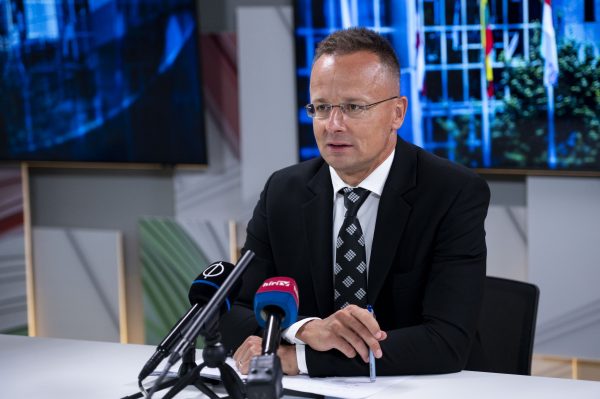Starting from January 1, 2025, the operation of the Druzhba oil pipeline supplying Russian oil to Hungary, the Czech Republic, and Slovakia will cease – announced Mihajlo Podoljak, adviser to Ukrainian President Volodimir Zelenskij, in an interview with Noviny Live portal. In case of a possible shutdown, retail prices of oil products would significantly increase if the missing quantity needs to be replaced. Ukrainians receive about $200 million annually for oil transportation, but their costs have increased due to the war. This raises questions about whether the current communication involves political or pricing pressure.
“If what the adviser to the Ukrainian President said is true and not just a threat, then the situation will be even more severe than what the shutdown of the Brotherhood gas pipeline on December 31 will mean,” said energy law expert Máté Tóth to PestiSrácok. The expert pointed out that the difference lies in the fact that while Hungary receives its gas supply from the south instead of the Brotherhood gas pipeline at Beregdaróc, which the Ukrainians also want to shut down. Therefore, this step affects the Slovak and Austrian supply more, but not the oil situation.
Currently, Hungary has two dependencies regarding oil. One is the Adria pipeline towards Croatia, and the other is the Druzhba oil pipeline towards Ukraine. These two dependencies would be exchanged for a single one, which would entail amazing exposure. From the perspective of EU law, this is very questionable, as we have seen the Croats increase transit fees fivefold, making Hungary completely vulnerable
– said Máté Tóth. The expert emphasized that the practical supply problem arises from the fact that currently, refineries in Central and Eastern Europe (including those in Százhalombatta, Bratislava, and Schwechat) are heavily reliant on a certain type of oil, although the transition away from this is already underway. He added:
So, unlike in the case of gas with methane molecules, it matters where and what type of oil arrives. Therefore, with this announcement, the Ukrainians are preparing for a breathtaking move that will seriously impact our supply.
Máté Tóth noted that this move exposes the narrative of the past months, which we heard from both the Ukrainians and EU officials regarding Lukoil’s exclusion from oil transit, claiming there was nothing to see. According to them, Lukoil’s exclusion does not affect the shipments of other transit companies.
Previously, Dombrovskis, the EU Commissioner for Economic and Trade Affairs, cynically remarked that there is nothing to see here. But the next step by the Ukrainians reveals that the past weeks or months of action on the oil line were indeed about squeezing Hungary and neighboring countries in supply, as now the Ukrainian side has stepped up
– the expert stated.
Why would the Ukrainians shoot themselves in the foot?
In the interview, Mihajlo Podoljak also noted that by shutting down the pipelines and excluding Russian energy carriers, Moscow would lose its best market.
Europe has been a reliable and good market, where the Russians have made the biggest profit. Everyone in Europe is working to ensure that Russia does not play a role on the continent
– he explained. However, Máté Tóth pointed out that with this move, Ukraine is losing a significant source of revenue, now with the exclusion from transit income. Beyond the direct American and EU financial transfers, the most important budgetary revenue source for Ukrainians is oil and gas transit.
Now, the fact that Ukraine announces the cessation of gas, and then after that, oil transit, giving up transit revenue essentially reveals that we are not facing autonomous, sovereign Ukrainian decisions, where the European Commission even passively acknowledges the step, but rather the other way around. (…) Who is the crazy person who, in Ukraine’s most financially strained situation, gives up one of its most important sources of income? Obviously, this only happens when a significantly larger creditor dictates it. Even in peacetime, it would be difficult to interpret this, let alone now.
The expert believes that the statement from the Ukrainian President’s advisor’s quote above is disingenuous because it is not Russia but Ukraine that loses market share. This is because the Russians will sell their oil regardless, even if they have to route it through India to Europe, while the Ukrainians lose their most important revenue source.
It is hard to imagine that this does not need to be done by order, so I clearly see the enforcement of interests that are much greater than even the European Union’s interests
– Máté Tóth stated.
Almost half of Ukraine’s electricity import comes through Hungary, but for how long?
“Currently, 42% of Ukraine’s electricity imports come through Hungary on three high-voltage lines, and Hungarian state companies have made significant investments to ensure that European and Ukrainian networks can operate in sync,” said earlier Minister of Foreign Affairs and Trade Péter Szijjártó. “Without all these measures, Ukraine’s electricity supply would not be safe (…) And yet, we had to face the fact that Ukraine is playing with the security of both Hungarian and Slovak energy supplies,” he added.
Meanwhile, MOL informed Index that the company has not received any signals regarding the shutdown of the pipeline, and if there were any changes, they would notify the public first. They claim to have existing and good business relations with the Ukrainian side, and the deliveries are ongoing. According to Index, Minister of Foreign Affairs and Trade Péter Szijjártó started negotiations in St. Petersburg on Friday morning because of this issue.

Máté Tóth stated regarding the issue that Hungary is extremely polite and gentlemanly towards Ukraine.
Despite the incredible Ukrainian legislative wave of enormous mistreatment towards Hungarians in Carpatho-Ruthenia from day zero, Hungary did not hinder to provide staggering humanitarian aid to Ukraine from the moment the war broke out on February 24, 2022. This did not hinder Hungary from making Ukraine one of the most important supply directions in terms of both refined oil products and gas amid this humanitarian assistance.
The expert reminded that the gas flowing through the Beregdaróc pipeline currently has a reverse flow, so instead of Hungary buying Russian gas through the Brotherhood pipeline, it is actually returning gas to Ukraine. Gas flows from Hungary to Ukraine through that line.
We are getting to the electricity here
Currently, Hungary supplies 42% of Ukraine’s electricity import through three high-voltage lines. According to Máté Tóth, this indeed gives Hungary a position to, if it wanted to, in a similar, albeit inelegant manner
shut off the electricity towards Ukraine, which would have very serious consequences in Ukraine.
The expert pointed out that there would be consequences in terms of both tension and frequency regulation. Considering that Western Ukraine is calibrated to Western European standards, while three-quarters of Ukraine have Russian networks, technology, frequency, and voltage regulation, Ukraine already has technological exposure towards the West. According to Máté Tóth,
it’s time for Hungary to consider what other tools it has in this situation, including taking a similar step with electricity.
What could the Ukrainian move cause in the domestic supply?
“MOL has made and is making extraordinary efforts, which is true for the past two years as well, to manage the various supply risks, both in terms of quantity and price,” said Máté Tóth. According to the energy law expert, other major oil companies do not show this societal responsibility in the same way. Therefore, there is no behavior of a market, especially a publicly traded big oil company that takes into account public interest. He added:
however, the resources are limited. And in this respect, I would begin to worry. When Lukoil was excluded from transit, with amazing speed and efficiency, an interim solution, a contractual solution with the entry of other oil companies into transit, was found. However, if traffic comes to a complete halt, this will no longer help.
As the expert pointed out, Hungary has approximately 90 days of reserves in the possession of MSZKSZ, the Hungarian Hydrocarbon Stockpiling Association.
Máté Tóth stated that after a certain point, neither MOL nor the Hungarian state has any influence on wholesalers, including OMV and everyone else present in the supply chains. These companies will inevitably begin to price in the changing shipping routes, the increasing transit costs posed by the Adriatic pipeline, or possible other shipping options (e.g., oil transport on the Danube with barges).
So in the long run, there is no magic potion, no miracle cure, to smooth out these price-raising effects. From now on, only state intervention and other alternative, legislative solutions can help mitigate or deflect the price shock that may occur in the long run. So in the short term, obviously these are the leading problems. In the long term, however, this Ukrainian move is truly threatening, as economic contracts and renegotiation positions can no longer defend against it.
💘love
💘love
😡anger
😡anger

![Neither Friendship nor Brotherhood – What Could be Caused and [object Object]](https://protectedsociety.com/wp-content/uploads/2024/09/1725178603_Neither-Friendship-nor-Brotherhood-What-Could-be-Caused-and.jpg)


